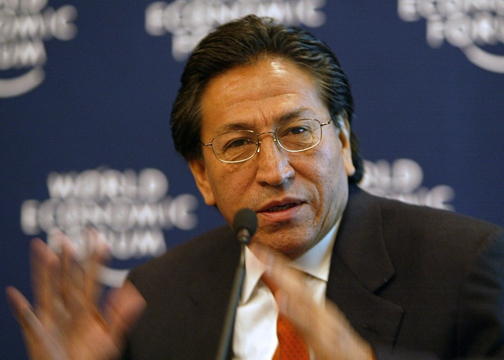
(above) Alejandro Toledo, then the president of Peru, speaks at the 2003 World Economic Forum in Davos, Switzerland. (World Economic Forum / Daniel Ammann)
Ex-Peru President to Remain Jailed Pending Extradition in Bribery Case
March 4, 2020 - Original article: Courthouse News Service
Nicolas Loving
SAN FRANCISCO (CN) – Despite testimony that the former president of Peru is at “grave risk” of mental and physical decline in a semi-isolated jail unit, a federal judge refused Wednesday to release him on house arrest pending his potential extradition on corruption charges.
UC Santa Cruz psychology professor Craig Haney, who has spent decades studying the impact of incarceration on human health, testified last month that ex-Peruvian president Alejandro Toledo Manrique has been deprived of meaningful human social contact, consequently suffers from depression and health problems, and is at “grave risk” of further deterioration.
U.S. District Judge Vince Chhabria previously ordered the federal government to release Toledo from jail unless it could end his solitary confinement in a protective custody unit at Alameda County’s Santa Rita Jail. The judge found the isolation was a “special circumstance” that justified releasing Toledo on house arrest.
Toledo was moved in October to a special housing unit in San Mateo County’s Maguire Jail, where he has more access to day rooms, a telephone and until late January, an inmate occupying an adjoining cell.
Despite those improved conditions, Toledo’s public defender Graham Archer argued the circumstances remain strikingly akin to solitary confinement and that his client’s health is rapidly deteriorating as a result.
In a 7-page ruling issued Wednesday, Chhabria rejected that argument, noting jail staff reported Toledo would sometimes change his demeanor from cheerful to depressed before mental health evaluations. Toledo did not take the stand to rebut those allegations.
The judge also found that while Haney’s expert testimony was credible, it was based on only two jail visits with the former head of state. Furthermore, Haney failed to consider a report in which Toledo told a jail psychiatrist he was not feeling as depressed or anxious when he took his medication, Chhabria added.
“Dr. Haney’s presentation of a disputed, secondhand account from a questionable narrator is not a reliable enough basis to rebut the presumption against bail on these facts,” Chhabria wrote.
Additionally, the judge found new evidence that came to light since October has also changed the calculus on whether Toledo poses a serious flight risk. Prosecutors discovered that Toledo’s wife, Elaine Karp-Toledo, failed to disclose a $1 million bank account when applying for a free federal public defender.
That new evidence prompted the court’s pretrial services office, which evaluates flight risk posed by defendants, to withdraw its prior recommendation that Toledo be released on house arrest with GPS monitoring.
Eight people from three states, including Toledo’s longtime friends, posted a $1 million bond to help secure the former Peruvian president’s release. Despite their confidence Toledo would not flee, Chhabria found the concealment of assets makes it less likely Toledo would honor his commitments.
“While lifelong friends have staked their homes or considerable assets on Toledo’s promise not to flee, his wife’s deception with respect to more than a million dollars in assets—and the possibility that still-hidden funds could aid an escape—is reason to doubt that Toledo will hold up his end of the bargain,” Chhabria wrote.
Wanted in Peru on suspicion of taking $20 million in bribes from a Brazilian construction company, Toledo claims the charges are false, politically motivated and based on coerced witness statements. Toledo led Peru’s government from 2001 to 2006.
Toledo was arrested on July 16 by U.S. marshals after the Peruvian government requested his extradition. Chhabria was assigned the case after an appeal was filed challenging U.S. Magistrate Judge Thomas Hixson’s Sept. 12 decision to keep Toledo in jail despite concerns about solitary confinement.
Toledo’s public defender, Archer, declined to comment on the ruling. But on Wednesday afternoon, Toledo filed a notice of appeal with the Ninth Circuit.